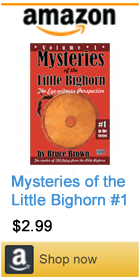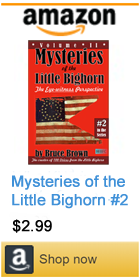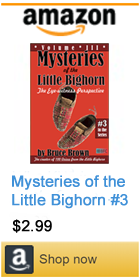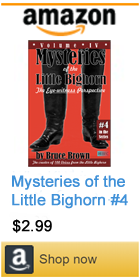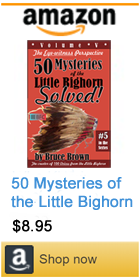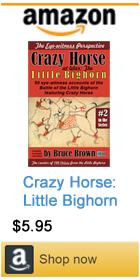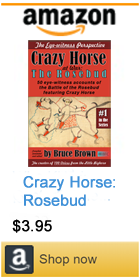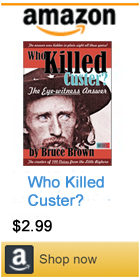|
|||||||
Bruce Brown's 100 Voices... Billy Garnett's Story
BILLY GARNETT'S ACCOUNT
In two or three days General Crook and the general of the Platte Department arrived and told the Indians that he would hold a council on White Clay. The council was arranged and it was understood General Crook was going to be there. I stayed with Baptiste Pourier, and we went ahead of General Crook and party to the Agency. While we were at the Agency, ahead of them, an Indian scout named Woman Dress came up and asked us where we were going. We told him that we were going to White Clay to an Indian council with General Crook and Lieutenant Clark, and we were waiting for them. He said, "Don't you go there with General Crook. When you hold this council at White Clay, Crazy Horse is going to come in there with sixty Indians, and catch General Crook by the hand, like he is going to shake hands, and he is going to hold on to him, and those sixty Indians are going to kill Crook and whoever he has with him." Just then General Crook and Lieutenant Clark came up in an ambulance, and soon after started for White Clay. Lieutenant Clark knew the place. Baptiste Pourier ran ahead and halted the team and said to me, "Now tell General Crook what Woman Dress said." So I told General Crook. I said, "General, this man (Woman Dress) says there is a man by the name of Little Wolf, an Indian Scout, who told his brother, Lone Bear, that they are going to kill you at the White Clay council, and Woman Dress says they are going to kill you." General Crook studied a little bit, and then asked me, "What do you know about this man, Woman Dress? Is he reliable? Does he tell the truth?" And I said, "General, this is a big undertaking and I could not say-I am going to leave it up to Baptiste Pourier, a man who is with me, and he will tell you." I turned to Pourier and he said, "General, I want to tell you that this man (Woman Dress) is truthful and whatever he tells you is the truth." So Crook studied again and said, "I never start any place but what I like to get there." Lieutenant Clark said, "General, it is no use to go. We lost a man just like you when we lost General Custer. There is no use for you to start in there when you have no protection." General Crook said, "What excuse I can make, I do not know." Lieutenant Clark replied, "You leave that to me." And General Crook said, "All right." Then Lieutenant Clark said to me, "Billy, you go to the council and tell them that a message has come for General Crook and he had to go back." He gave me a list of Indian names, and he told me to tell those men to report to Fort Robinson right away. So I went on to the council at White Clay. When I arrived, Crazy Horse was not there and none of his followers were there either. I did not see any of them in the council. So I got American Horse (who was there) and I told him just exactly what I was told to tell in that council, and American Horse reported that "General Crook was coming, but he got a letter on the way and he had to go back, and that is why he isn't here, the interpreter just tells me. So he won't be here to-day." Then I went back to Fort Robinson and told General Crook and Lieutenant Clark that the Indians were coming-those that they wanted -and they arrived in about one-half hour after I got there. Then they made plans to get hold of Crazy Horse. Each one of.the Indian Chiefs was to pick four followers, and that night they were to go to the village of Crazy Horse and kill him. Later I went back to the sutler's store, and was there about half an hour when a soldier came to me. It was Lieutenant Clark's orderly, and he brought word that Lieutenant Clark wanted to see me. When I reported to the Lieutenant he told me to go down to the Indian village and stop the Indians from approaching Crazy Horse; and have them report to Fort Robinson before sun-up in the morning. So I went and delivered that message not to kill Crazy Horse that night, but to report to Fort Robinson before sun-up and draw ammunition and guns. This they did, reporting at Fort Robinson where they were supplied with guns and ammunition and then we started for the village of Crazy Horse. Arrived at the village, we found Lieutenant Clark there and many Indians. There was considerable excitement and activity. Lieutenant Clark came up with 28 or 30 followers, and the Lieutenant arranged for a party of our Indians to follow Crazy Horse and bring him back to the agency. Next day some of the Indian Scouts that had gone after Crazy Horse returned and reported that Crazy Horse was coming back to Fort Robinson the following day with Major Lee of the Spotted Tail Agency. When they arrived at Fort Robinson, Lieutenant Clark sent me down there with word to the officer to put Crazy Horse in the Guard House. As I approached within 35 or 40 feet of the Adjutant's office, I saw the officer of the day, the Indian Little Big Man and Crazy Horse come out. Crazy Horse was in the middle. They walked toward the guard house which was about 60 yards away, and finally got to the guard house and went in. Probably half a minute afterwards something happened in there. I could hear the noise inside. A sentinel was walking back and forth on the outside of the guard house. I stopped and looked. I was probably 60 or 70 feet from the guard house door. By this time there were a lot of Indians on hand. They were of the band of Crazy Horse. Presently Little Big Man and Crazy Horse appeared. Little Big Man had Crazy Horse by the wrists and Crazy Horse had a knife in one of his hands and he was trying to break loose from Little Big Man. Just then, when they came out of the door, the sentinel had his bayonet pointed, and he watched the scuffle. He directed his bayonet at Crazy Horse and made a little pass, just enough to touch him. I always thought that the sentinel did not intend to stab Crazy Horse, but only to touch him so that he would drop his knife. But in the struggle, Crazy Horse stumbled against the bayonet. It did not appear to me that Crazy Horse was stabbed as badly as he was. Doctor McGillicuddy, the surgeon, after examination, said that the bayonet went through both kidneys and within one-half inch of going through his body. When the sentinel stabbed him, Crazy Horse said, "He has killed me now." Nine or ten years afterwards I found out that what Woman Dress said about Crazy Horse intending to kill General Crook was not true. It was all framed up against him; not by white people, but by Indians who were jealous of him. About nine or ten years later I was in the guard house here and Little Wolf and Lone Bear were policemen. Little Wolf was sitting in the guard house one night with me and he said, "Now we came in from the North with Crazy Horse; we intended to be peaceable with the white people; the same as the other Indians. I wonder why Crazy Horse was treated the way he was, and finally died." And I thought back and I said, "You killed him." I told him that his talk killed Crazy Horse. I said, "You told your own brother, Lone Bear, that Crazy Horse was going to kill General Crook." He replied, "I never told my brother any such stuff. I never knew that I had anything to do with this. I am going to see my brother." So the next time I met him he came to me with Lone Bear, his brother, and he denied that he told Woman Dress that General Crook was going to be killed. "I never told Woman Dress any such thing," he said. About three months afterwards, they caught Woman Dress near Fort Robinson, and Woman Dress came up to me with Louis Shangreau (his nephew) and said, "You can tell as good a lie as any one I ever saw." I said, "Woman Dress, what am I lying about?" And he said, "You lied about me. I heard Crazy Horse say, 'Tomorrow there is going to be a council on over at White Clay, the Indian village, and Crook's going to be there. I will catch Crook by the hand and pretend like I was going to shake hands with him and make quick work of him and whoever he will have with him.' Now that is what I heard Crazy Horse say. You said in the guard house that Little Wolf was the one who told Lone Bear, and Lone Bear told me. It was I, myself, that heard Crazy Horse, and now you tell lies about me by saying that I got it from Lone Bear." About this time Baptiste Pourier came up, and I told Louis Shangreau that Bat knew all about the matter, and that he would finish with him. I told him that he and his Uncle (Woman Dress) were not telling the truth, and Bat explained what took place in 1877 when Crazy Horse was killed. Bat said,"I will tell -- I know just exactly how it happened." He told just how it occurred, and Louis Shangreau was mad at his Uncle then, and turned around and said, "You are a big liar and you are the cause of a good man's death. You were jealous of him." Then Bat, with his finger at Woman Dress, told him, "You are a liar and you are the cause of a good man's death." And Louis Shangreau said the same thing, and Woman Dress never said a word. I told General Crook about this when he came here in 1889. Bat and I were together and told him. "Bat," General Crook said, "Billy knew more than you did, he did not recommend Woman Dress that time. I ought to have gone to that council and I should not have listened to Clark. I never started any place but I got there." The way this came up, Crook was here at a council in 1889 when they were dividing up the reservation. Woman Dress reported that Little Hawk wanted to make some trouble about signing the Treaty, and he was talking very sassy. General Crook sent for Little Hawk and said, "Why are you making trouble about this Treaty?" Little Hawk replied, "General Crook: I have been faithful to you people; you killed Crazy Horse; now are you going to kill me? Your Indians are telling lies about me like they told about Crazy Horse; and now are you going to kill me?" Crook said, "No, I found out about what made the trouble about Crazy Horse afterward; you Indians made the trouble -- I felt sorry for that." It is a great pity that Crazy Horse was killed for he had the reputation of being 'one of the bravest men that ever lived. In all the fights in Wyoming, the soldiers were all firing at Crazy Horse and trying to kill him. There are a great many old soldiers at Hot Springs, South Dakota, now who could tell you about shooting at Crazy Horse. Crazy Horse was no politician about talking; but he was one of the bravest men among the Sioux. The Crow Indians used to say, "We know Crazy Horse better than we do you other Sioux. Whenever we have a fight, he is closer to us than he is to you." The way they recognized him in a fight was that, he always wore a colt hide as a cape. (Signed) Pine Ridge Agency, S. D., August 19, 1920. Soldiers of the Plains by P.E. Byrne, Minton, Balch & Co., New York, 1926 p 234 - 243
William or Billy Garnett's father was Brigadier General Richard B. Garnett, who was killed at the battle of Gettysburg in 1863, fighting for the Confederacy, and his mother was a full blood Oglala Sioux Indian. Beginning in 1873, when 18 years of age, Billy Garnett was employed as an interpreter at the Red Cloud Agency. |
|||||||



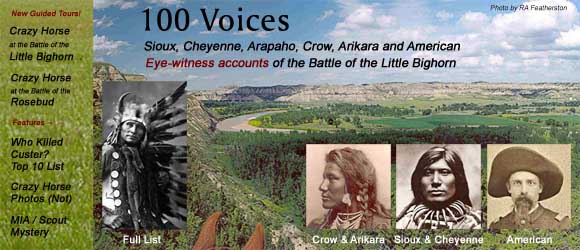
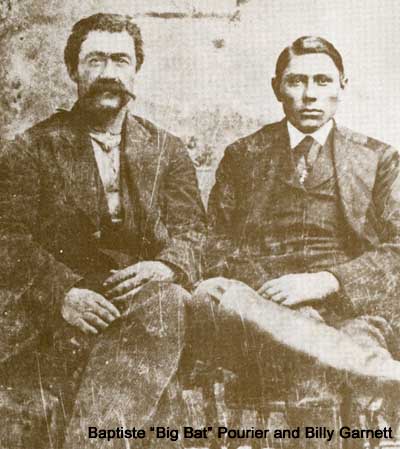 WE GOT along with Crazy Horse pretty good, just the same as with any friendly Indian. In the month of August word came that the Nez Perces had broken out, and were working toward Wyoming. Lieutenant Clark was going to take some scouts out there where the Nez Perce trouble was, and we had Crazy Horse and other Indians consult over trying to capture them. Crazy Horse said if he was going, he was going to take all his lodges, and he was going to hunt at the same time. Clark said that he didn't want the lodges and women; that he just wanted the men.
WE GOT along with Crazy Horse pretty good, just the same as with any friendly Indian. In the month of August word came that the Nez Perces had broken out, and were working toward Wyoming. Lieutenant Clark was going to take some scouts out there where the Nez Perce trouble was, and we had Crazy Horse and other Indians consult over trying to capture them. Crazy Horse said if he was going, he was going to take all his lodges, and he was going to hunt at the same time. Clark said that he didn't want the lodges and women; that he just wanted the men.